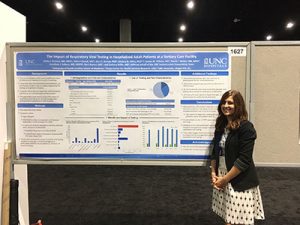Inpatient Clinical Rotations
Core Inpatient Consultations:
1. General Infectious Disease Rotation
- Provide care to a broad spectrum of inpatients with infectious complications including bacterial, viral, fungal, parasitic infections or fever of unknown origin
- Develop diagnostic and therapeutic skills as related to the infectious complications of patients who have solid organ transplants, HIV/AIDS, neutropenia, hepatitis, foreign travel, malignancies, dialysis or other immunocompromising conditions
- Develop skill selecting and prescribing antimicrobial agents, with special emphasis on pharmacology
- Gain consultative skill interacting with all other hospital staff and outside referring physicians
- Develop skills in clinical and diagnostic microbiology through daily “plate rounds”
- Develop administrative and management skills through supervision of house-staff and students
- Develop teaching skills through organization, presentation and discussion in clinical case conferences.
2. Immunocompromised Host ID (ICHID) Consult Rotation
The immunocompromised host infectious diseases service at UNC serves several vulnerable patient populations in close collaboration with our surgical and medical colleagues. We provide patient-centered inpatient consultation, where the infectious disease fellow works in close collaboration with a dedicated ICHID attending as well as outpatient follow-up care.
Patient populations that we care for include:
Lung, heart, kidney, liver and pancreas transplantations are all performed at UNC
- Allogenic and autologous stem cell transplant recipients
- Patients with hematologic malignancies such as leukemia and lymphoma
- Patients with burn injuries who are being cared for in the NC Jaycee Burn Center
Additional Required Inpatient Rotations:
1. Antimicrobial Stewardship/Outpatient Parenteral Anti-Infective Therapy (3 weeks):

The goal of the AST/OPAT rotation is to gain familiarity with the process and application of these two important areas of ID practice.
- Become familiar with the conduct of prospective audit and feedback for antimicrobial alerts in a tertiary-care hospital
- Participate in programmatic quality improvement related to appropriate use of antimicrobials in order to improve patient outcomes, decrease the spread of multi-drug resistant organisms, and decrease cost
- Participate in hospital administrative committee proceedings related to AST (e.g. Anti-infective subcommittee)
- Gain an understanding of OPAT fundamentals including screening of referrals to the program, follow-up of patients on OPAT, communications with referring teams, urgent care and end-of-therapy visits.
2. Hospital Epidemiology (4 weeks):
The Hospital Epidemiology rotation aims to provide experience with the surveillance, administrative and occupational health functions of the Hospital Epi group as well as management of outbreaks and exposures. Activities during this rotation include:
- Surveillance of healthcare-associated infections, working with the Infection Control Professional and the Public Health Epidemiologist
- Participation in Infection Control Committee meetings
- Participating in needlestick exposure evaluations
- Assisting with Hospital Epidemiology and outbreak evaluations (working with Hospital Epi staff and faculty)
- Gaining familiarity with new healthcare employee evaluations and healthcare provider respirator assessments
- All fellows are required to take the online course offered by the Society for Healthcare Epidemiology of America, which consists of a pre-test, 12.5 hours of lectures and a post-test. There is no cost to trainees for the course.
Additional Optional Inpatient Rotations:
Pinehurst Infectious Diseases Rotation (FirstHealth Infectious Diseases/Moore Regional Hospital, 2 weeks):
- Learn how to provide first-line ID care in a large community hospital
- Receive focused training on infections in the elderly, as well as fracture-fixation hardware and prosthetic joint infections
- Become familiar with management aspects of private practice infectious diseases